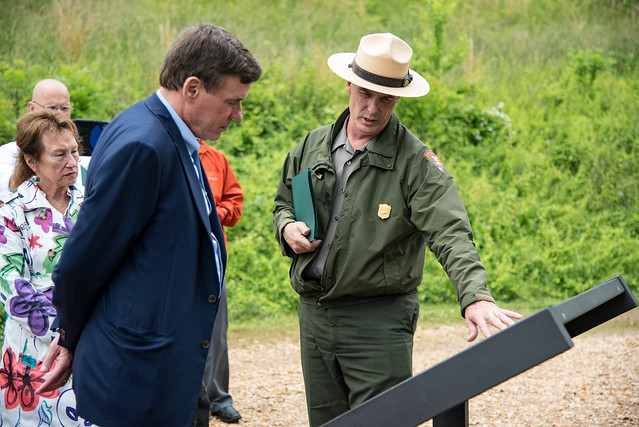Priorities
Free Lance Star: Sen. Mark Warner visits Fredericksburg battlefield to tout parks-maintenance bill
May 05 2017
By CLINT SCHEMMER
U.S. Sen. Mark Warner came to Fredericksburg Friday to press his solution for one of the country’s perennial problems—the growing backlog of maintenance issues in its national parks.
After looking out over the city from the heights of Fredericksburg National Cemetery, where 15,000 Union dead from many Civil War battles rest, the Virginia Democrat said America needs to be a better steward of its parks. Their list of needed repairs for buildings and roads has been growing for decades, he told more than a dozen people, including local elected officials, who visited the Fredericksburg battlefield with him.
“If we don’t take care of the $12 billion backlog in maintenance, future generations aren’t going to see this park and this cemetery in the way that we get to see it today,” Warner said. “… If we don’t put our money where our mouth is, as a Congress, to represent, preserve and maintain this history, then we’re not doing our job.”
To resolve this long-building crisis, Warner recently introduced the National Park Service Legacy Act, which would put unallocated money from federal mineral-extraction royalties toward tackling the most critical projects in a mammoth backlog built up over decades.
It’s the first time a U.S. lawmaker has proposed a fix for the problem in a budget authorization bill.
In an interview outside the Fredericksburg Battlefield Visitor Center, Warner said the issue became more evident to him last year as people across the country celebrated the Park Service’s 100th anniversary.
“If we don’t do the maintenance, Americans aren’t going to be able to enjoy and actually understand their history,” he said.
Virginia ranks fifth nationally among the states with the largest backlogs, with $800 million in deferred and overdue maintenance at its Park Service sites, Warner’s office said.
The Fredericksburg-area park has $11 million in deferred maintenance on the books, Chief Historian John Hennessy said. At $7 million, the biggest-ticket items are its roads and parking areas. Buildings need another $2 million, notably including Chatham Manor, the two greenhouses at Chatham, the Chatham farm office, Old Salem Church in Spotsylvania and the Wilderness Exhibit Shelter.
Nationally, between fiscal 2006 and 2015, discretionary appropriations to address the Park Service’s deferred maintenance needs decreased by 43 percent, after adjusting for inflation. Annually, congressional appropriations for those projects have averaged $521 million, or just 4 percent of the Park Service’s backlog.
If enacted, Warner’s legislation initially would provide an additional $50 million in each of the next several fiscal years, ramping up in later years to $150 million and then $250 million, with $500 million set aside for 20 years starting in fiscal 2027.
“It would still be a [multi-year] process, but at least we’d have a dedicated source of funding,” he said.
Private donations would also be accepted by the National Park Service Legacy Restoration Fund, housed at the Treasury Department.
Warner said he is hopeful about the bipartisan proposal winning wide backing. Sens. Rob Portman, R–Ohio, and Tim Kaine, D–Va., were Senate Bill 751’s first cosponsors. Seven other senators have signed on: Angus S. King Jr., I–Maine; Brian Schatz, D–Hawaii; Susan Collins, R–Maine; Lamar Alexander, R–Tenn.; Dianne Feinstein, D-Calif; Amy Klobuchar, D–Minn.; Joe Manchin III, D–W.Va.; and Shelley Moore Capito, R–W.Va.
“There are very few areas where there is such uniform support as there is for the Park Service,” Warner said. “Twelve billion is a lot of money but, in the relative scheme of things, this is very doable.
“It would be great to come back here and tell these [Park Service] professionals, ‘Hey, we’ve got an income stream to make sure that this park is going to be here in pristine state 50 years from now.’”
Tom Cassidy, vice president for government relations at the National Trust for Historic Preservation, said a bevy of nonprofit groups—including the National Trust, Civil War Trust, National Parks and Conservation Foundation and Pew Charitable Trusts—“are working together, hand in glove, to get this legislation across the finish line.”
Warner walked the battlefield’s Sunken Road, inspected the interior of the bullet-riddled Innis House, admired the Brompton mansion on Marye’s Heights, and was visibly moved at seeing the thousands of graves of unknown dead in the national cemetery.
Standing with him on the cemetery’s hilltop, Fredericksburg Mayor Mary Katherine Greenlaw and Councilman Matt Kelly, a bipartisan duo, thanked Warner for recognizing the depth of the parks’ problem.
“The number of people that come up here in the evening on Memorial Day at evening, in silence, to revere these folks is indicative of how important this place is to the American people,” Greenlaw said. “And Congress needs to respond to that.”
